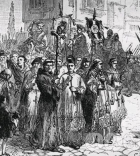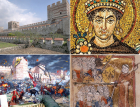Narrative in history
History teachers, academics and policy makers have often expressed concerns about the value accorded to narrative in school history, suggesting that an over-emphasis on certain concepts and processes – most obviously, causation and the critical evaluation of sources – has tended to obscure the importance of being able to put together a clear story. Constructing an effective narrative account, it has been argued, is not only an essential and demanding task in its own right and one that is fundamental to historians’ work; it is also the foundation on which other kinds of historical knowledge are built, and should therefore be more highly prized by teachers and within public examinations. Read more
Sort by:
Date (Newest first) | Title A-Z
Show:
All |
Articles |
Podcasts |
Multipage Articles
-

Helping Year 8 to understand historians’ narrative decision-making
ArticleClick to view -

High achievement in history in a nutshell
ArticleClick to view -

History Teaching in Belarus: Between Europe and Russia
ArticleClick to view -

Little Jack Horner and polite revolutionaries: putting the story back into history
ArticleClick to view -

Marr: magpie or marsh harrier?
ArticleClick to view -

Maximising the power of storytelling in the history classroom
ArticleClick to view -

Modelling the discipline
ArticleClick to view -

Mussolini's marriage and a game in the playground: using analogy to help pupils understand the past
ArticleClick to view -

Narrating “Histories of Spain”
ArticleClick to view -

Narrative: the under-rated skill
ArticleClick to view -

New, Novice or Nervous? 164: Constructing narrative
ArticleClick to view -

Nutshell
ArticleClick to view -

Nutshell
ArticleClick to view -

Nutshell
ArticleClick to view -

Placing history: territory, story, identity - and historical consciousness
ArticleClick to view -

Planning a more diverse and coherent Year 7 curriculum
ArticleClick to view -

Pupil-led historical enquiry: what might this actually be?
ArticleClick to view -

Putting Catlin in his place?
ArticleClick to view -

Reflecting on rights: teaching pupils about pre-1832 British politics using a realistic role-play
ArticleClick to view -

Stretching the straight jacket of assessment: use of role play and practical demonstration to enrich pupils' experience of history at GCSE and beyond
ArticleClick to view

